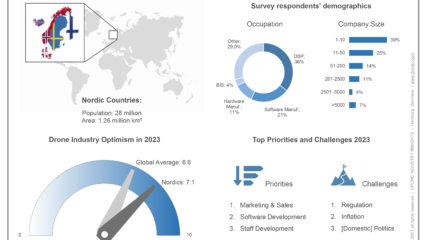Youth rising to the challenge of drones in Zimbabwe

Tawanda Chihambakwe. He is a young Zimbabwean who thought he was headed for a decent career in media and fintech, but a chance meeting with a drone changed all that.
“I have a friend who introduced me to them in 2016, and from then, I was hooked,” he says. He followed the drone rabbit hole online, where he discovered drone racing, which led him to introduce amateur drone racing in Zimbabwe in 2017. Since then, Tawanda has gone on to found Precision Aerial, a drone company which offers commercial services for the agricultural, mining and security industries. He also has lent his thoughts to a drone anthology by Louise Jupp, a book which goes deep into the realm of drone technology and how to get the best out of Unmanned Aerial Vehicles and unmanned systems.
As a young African drone entrepreneur, Tawanda has a story to tell, and we sat him down to tell it. Below are some of his thoughts about drones and the drone community in his country.
But first, the most important question…
Do you have a drone yourself; and what do you use it for?
I have several different types of drones. Thirteen to be precise. This includes three racing drones, two hobby drones, three toy drones for training kids, one experimental custom build for drone deliveries, one Crop Sprayer and one Industrial grade drones. I use my drones for various projects across many sectors and to teach others how to operate a drone safely and responsibly.
What good can drones bring to Zimbabwe?
Drones can do so much in this country across multiple sectors. Zimbabwe is an agro-based nation, and our company offers solutions in agriculture, like aerial crop spraying, which saves them a third of the time and money they spend on current spraying methods. There are also crop and plant health assessments that can be done with drones which help to increase the crop yields as a method of precision agriculture. Drones can also help monitor drought patterns and the effects of climate change in farming areas by gathering data that can be analysed and used to determine trends.
In mining there are many use cases for drones in Zimbabwe and almost all of the big mining companies own at least one or two drones or they hire drone operators regularly to help with surveys, aerial imagery and mapping. The local construction industry has been a bit slow in adopting drone technology in but there is great potential in this sector.
In 2019, when Cyclone Idai hit parts of Zimbabwe, we mobilised a group of drone owners to help with search and rescue and mapping for post-disaster management. Through the drone forum I started, we had more than 20 drone owners come forward and volunteer their equipment and skills to help with the disaster.
We have done many other projects across multiple sectors in Zimbabwe that prove that drones can do good here.

How big is the drone community in Zimbabwe, and how bigger can it get? What industries have taken the drone kool aid faster, and in which area are drones likely to grow next?
We are quite big. I have personally worked with hundreds of drone owners and operators. There is a health potpourri between recreational drone enthusiasts and commercial or industrial grade drone operators. We now have drones being sold in supermarkets, although they sell toy and recreational drones.
The commercial side of our industry is still finding its feet; though there are no official retail stores for drones yet in the country. But the interest we have received between the public drone awareness events we host and the television appearances we have made as a company have shown that there is great potential especially for young people to enter this industry. Of course, all of this will be dependent on proper infrastructure being in place and reasonable regulation put in place.
Right now, the most likely sectors to show a boom in adoption – after agriculture, mining and media – include wildlife conservation and security.
What relationship, if any, does the drone stakeholders have in the country? Are they working together or each is doing their own thing?
That is an area we still have to work out. Drone stakeholders are generally secretive about their operations and do not openly share information. I partly blame our culture for that; we are not easily inclined to opening up to other people. But the biggest grey area is around regulations. We do not have official drone laws as yet in Zimbabwe, which makes people uneasy about flaunting their operations. 99 percent of drone operations in Zimbabwe are of questionable legal status because drone operators here don’t have pilot licenses and they are not available locally. Only a handful of people (including me) have been formally trained as drone professionals with pilot licenses. It also means that certain people or companies are able to have an unfair competitive advantage over newcomers in the industry.
There is knowledge sharing is very little. Each drone operator and company does their own thing and tries to undercut any competition.
Speaking of the law, what have been your experiences with legal authorities in the country as far as drones are concerned? How restrictive or accommodative are the drone laws in Zimbabwe?
As a licensed drone professional, I have found that our local civil aviation authorities (Civil Aviation Authority of Zimbabwe) and law enforcement have been quite receptive to the work we are doing with drones. We work with the local authorities and help enlighten them on best practices for the drone industry to grow in Zimbabwe and we share our experience working with drones in other countries like South Africa and Kenya.
Sadly, with our industry still in its infancy, there are operators still without registration and pilot licences, and this has affected their eligibility to land higher-value commercial drone projects. The result is that many foreign drone owners and drone pilots come into Zimbabwe and take up commercial drone work that should be done by locals.

You have published a book about drones. Can you please share with us what it is about?
I’m privileged to have been invited to co-author a book called Drone Professional 1 which features drones, professional drone pilots, drone software and technology, civil aviation, commercial aviation, drone science and drone education. The book was edited by Louise Jupp and had contributions from drone professionals from all over the world who comprise me, Benoit Le Ber, Jasper Schmeits, Anne-Lise Scaillierez, Filippo Tomasello, James Oliver, S. James Ellis, Debbie Jewitt, Robert Miller, Justin Melman, Janna Mae Rubin, Rabih Bou Rashid, Kim James, Graham Dyer and Arie van Ravenswaay.
In it, we share our expertise and experience on commercial drone issues, which include technical and personal anecdotal experiences with drones. The sheer wide range of contributors has armed the book with an amazing collection of inspiring professional drone applications stories. It truly was an honour for me to share my views in a chapter titled Education and The Future of the Drone Profession. Here I highlighted some research I’ve been gathering over the years about how the future of the drone industry and the extent of its development is hinged on how we teach young students about drones. I explain how the top drone manufacturers in the world are heavily involved and committed to getting the most intelligent and highly skilled young minds into the industry and how they have built programs to attract the best young talent.
I also made clear distinctions and created definitions for drone owners, pilots, and professionals to help differentiate between those who simply buy a drone and teach themselves to fly it and those who are trained professionally on how to operate them. Furthermore, my writings in the book explored ways in which schools and governments at large can create programs for students to learn about drones as part of the practical side of Science Technology Engineering and Mathematics (STEM) subjects.
The book is very well put together and is a must-have guide for anyone wanting to get into the drone industry.
Do you have ongoing projects in place to promote the growth of drone technology in Zimbabwe?
Yes. We have the Commercial Drone Owners Forum, which focuses on information sharing between drone owners that want to make money with their drones. We also run the drone racing community where we meet as drone racing enthusiasts and we host events that invite the public to experience drone racing.
There is also the Drone Information Hub which is a platform for students in high school and university where we teach them about drones and show them career paths leading into the drone industry. We also create drone content that is aired on national TV and online to encourage people to get into the industry.
Please share with us what prompted you to leave your former profession and get involved with drones
I’m an entrepreneurial person and even during full-time employment, I would always be experimenting with my own ideas. I found out about drones through a Fintech project I was working on many years ago and after doing extensive research on drones for several months I started on my journey with drones.
What future do you see for the drone industry in the country?
The local drone industry is poised to transform the way work is done across multiple sectors in Zimbabwe. As one of the catalysts for the 4th Industrial revolution, drones will create many new jobs for young people. This will be driven by education on drones to students in schools and universities as part of the STEM subjects curricula. Being able to use a drone and interpret the data gathered by drones are amongst the skills of the future needed to make sure that young people coming out of schools have the right tools to do well in our ever-changing world.
I foresee many new career paths because of drones, beyond just being a drone pilot there are many other roles one can be involved in with drones. The economy will also benefit from the growth of this industry as the potential size of this industry runs into millions of dollars. Zimbabwe is also well positioned to start manufacturing drones and drone parts locally with a highly skilled and largely unemployed workforce who could build and export drones given the right stimulus. Drones will fundamentally change the way work is done in so many sectors and even reduce the risk to human resources in many job situations. In the future, food security will be bolstered, animals will be better protected, and people’s lives will be saved in Zimbabwe because of drones.








0 Comments